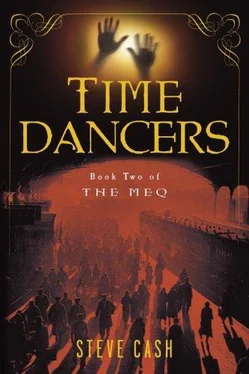Steve Cash - Time Dancers
Здесь есть возможность читать онлайн «Steve Cash - Time Dancers» весь текст электронной книги совершенно бесплатно (целиком полную версию без сокращений). В некоторых случаях можно слушать аудио, скачать через торрент в формате fb2 и присутствует краткое содержание. Год выпуска: 2006, ISBN: 2006, Издательство: Del Rey, Жанр: Фэнтези, Детективная фантастика, ya, на английском языке. Описание произведения, (предисловие) а так же отзывы посетителей доступны на портале библиотеки ЛибКат.
- Название:Time Dancers
- Автор:
- Издательство:Del Rey
- Жанр:
- Год:2006
- ISBN:0345470931
- Рейтинг книги:4 / 5. Голосов: 1
-
Избранное:Добавить в избранное
- Отзывы:
-
Ваша оценка:
- 80
- 1
- 2
- 3
- 4
- 5
Time Dancers: краткое содержание, описание и аннотация
Предлагаем к чтению аннотацию, описание, краткое содержание или предисловие (зависит от того, что написал сам автор книги «Time Dancers»). Если вы не нашли необходимую информацию о книге — напишите в комментариях, мы постараемся отыскать её.
Time Dancers — читать онлайн бесплатно полную книгу (весь текст) целиком
Ниже представлен текст книги, разбитый по страницам. Система сохранения места последней прочитанной страницы, позволяет с удобством читать онлайн бесплатно книгу «Time Dancers», без необходимости каждый раз заново искать на чём Вы остановились. Поставьте закладку, и сможете в любой момент перейти на страницу, на которой закончили чтение.
Интервал:
Закладка:
Ray was taken to an open courtyard covered in multicolored tile, laid in intricate geometric patterns, and introduced to Baron Ernst Rudiger von Steichen, the German-Austrian patriarch of a family and a business that spanned generations going back a thousand years or more. Their roots were in the lake country outside Salzburg. Their business was salt. The Baron seemed startled or puzzled at first, then shook his head slightly and smiled, asking Ray in English which would he prefer, tea or coffee? Ray liked the old man the instant he stared into his bright blue eyes and guessed him to be about seventy-five years old, but quick, slick, and charming as a riverboat gambler. The Baron assured Ray a considerable amount of gold would be deposited into a private account that would be established in his name, in Zurich, within a week. Ray could verify this before they ever left Dar es Salaam. After that, the Baron warned, where they were going or when they would return could not be accurately predicted. Ray said he would do it for nothing, but the Baron wouldn’t have it and insisted on paying him. Ray agreed and was immediately escorted by the old man to another part of his estate where forty or fifty men were busy sorting through massive amounts of supplies that lay strewn across the grounds of a polo field. It was a fully outfitted safari on the verge of departure. The Baron turned and told Ray he’d been waiting for him.
Six months later Ray had seen Mount Kilimanjaro and heard the sounds of the Serengeti at night. He had learned two languages and shared the campfires of warriors, herdsmen, fishermen, and kings. They had pushed on west to the shores of Lake Victoria and north to a river with three different names. This river and a reliable new guide would eventually lead them farther north to the remote area around Lake Turkana. From there, and for the next seven years, Ray and the Baron chased rumors and legends of the Meq girl’s origins. They never found a trace of her and by then the war had broken out, causing the Baron concern for his estate in Dar es Salaam. He decided with great reluctance to finally abandon his quest and return to protect his property. They made their way east to the port of Djibouti, where the Baron sold all his goods to local traders and procured illegal passage down the coast, avoiding any confrontations or blockades along the way.
The Baron’s estate was intact and the place became a safe haven for him and Ray during the early stages of the Great War, as it was fought in East Africa. The Baron confessed to Ray that he had a son and grandson who were both fighting for the German army, somewhere in France. He tried to persuade his friend, General von Lettow-Vorbeck, to arrange for their transfer to Africa. It never happened. When Dar es Salaam was under siege and then bombarded, the old man’s estate was destroyed. Baron Ernst Rudiger von Steichen was hit and killed by flying debris during one of the explosions. Ray said his own leg, arm, and five of his ribs were broken in the blast and it took him nearly a week to heal. Once he did, he contacted the Baron’s family in Salzburg. The Baroness Matilde, granddaughter-in-law to the Baron, sent a long letter in return, thanking Ray and giving him the sad news that the Baron’s son and grandson had both been killed in the war. In a postscript she asked Ray if he could somehow bring the Baron’s body back to Salzburg. She wanted to bury them all among their own family and ancestors.
War makes pirates and strange bedfellows out of almost everybody. With his abundance of street skills and plenty of money, Ray was able to smuggle himself and the Baron’s coffin by ship to the Black Sea, then up the Danube all the way to Linz, where he made connections to Salzburg. The trip was a difficult and dangerous journey, but Ray made it in less than four months.
In Salzburg, he was met and welcomed by the Baroness Matilde. Ray said he could tell instantly that she knew he was Meq and in thirty minutes they were driving through the gates of the von Steichen “family spread,” as Ray called it. Nestled between a lakefront and the sheer rock face of a mountain, and connected across an entire hillside, stood a series of castlelike stone structures. This had been the home of the von Steichens since the Middle Ages.
The Baroness showed Ray to his quarters deep within the complex. Ray said there were so many buildings, most with additions and additions to the additions, it felt more like its own village than a family home. The master bedroom of his suite was covered in three-hundred-year-old rugs from Isfahan and even older Venetian tapestries hanging on the walls and over an enormous fireplace with a mantel well above Ray’s head. The Baroness asked him to stay for the funeral and Ray accepted. She was alone now in the great home. Her mother-in-law had suffered a stroke during the war, as had the last Baroness, the Baron’s own wife of fifty years. She died without ever knowing his fate and Matilde guessed it had been the same for the Baron. Ray told her the Baron always referred to his wife as a living person. That was comforting news to the Baroness Matilde. She then asked Ray to stay for as long as he liked, for the duration of the war if he wished. Ray told her it might be a good idea to “sit out the squabble,” as he referred to waiting for World War I to end. She also hinted that she had a special place to show him, saying it was the source of the Baron’s mad quest.
Ray stayed in Salzburg with the Baroness for almost a year, becoming her closest friend and acquiring in the process his newfound interest in Mozart and modern painting. At war’s end, he decided to return to the city of his birth, Veracruz. The Baroness understood and they said their farewells in Salzburg at the train station. Ray then headed for Switzerland to pick up the gold the Baron had insisted on paying him. After a brief stop in Munich, where he met and talked with a character named Hess that Ray described as “a real piece of work,” he found the bank and the gold waiting for him in Zurich. He traveled south to Marseille and boarded a ship sailing for Panama. From Panama, he made his way to Mexico and eventually St. Louis, in order to “save my ass,” as he reminded me.
Ray stopped his tale and looked out the window. The train was slowing down and the sun was just rising in the east. We were approaching the outskirts of Cleveland. Ray smiled to himself and reached into his vest, pulling out a packet of photographs and staring down at them.
“Well?” I asked. “Did she ever show you the special place?”
“That’s the part you ain’t gonna believe, Z. But I want you to look at something first. The Baroness let me take some photographs before I left.”
“Photographs of what?”
“Paintings—portraits painted by Vermeer and Botticelli.”
“Are they rare?”
“Yeah, you could say that, only I think the word ‘rare’ ain’t nearly enough. These are portraits of the same girl.” Ray stopped talking and looked at me for a reaction, then he said, “Vermeer lived almost two centuries later than Botticelli.”
“Then…how is that possible?”
“You mean I’ve gotta explain it to you, Z? You can’t figure that out?”
“She’s Meq?”
“You got it.” Ray handed me the photographs. “Look at her, Z. The Baroness told me her name is Susheela the Ninth. She’s Meq, all right, but she ain’t Egipurdiko or Egizahar.”
The photographs were sharp and clear, but they were not in color. Ray described the colors for me, mentioning especially the green of the girl’s eyes in the portrait by Vermeer. “If you’ve ever seen Vermeer’s blues, then you’ll know what I mean,” Ray said. “Her eyes are the greenest damn green I’ve ever looked on, Z.”
I studied the portraits closely, amazed and bewildered by what I saw. The girl was Meq without a doubt; her individual features, specifically her lips, were even similar to Opari’s. However, there was one very obvious and unexplainable difference, a difference unlike any other difference between us. The Meq girl in both portraits was black.
Читать дальшеИнтервал:
Закладка:
Похожие книги на «Time Dancers»
Представляем Вашему вниманию похожие книги на «Time Dancers» списком для выбора. Мы отобрали схожую по названию и смыслу литературу в надежде предоставить читателям больше вариантов отыскать новые, интересные, ещё непрочитанные произведения.
Обсуждение, отзывы о книге «Time Dancers» и просто собственные мнения читателей. Оставьте ваши комментарии, напишите, что Вы думаете о произведении, его смысле или главных героях. Укажите что конкретно понравилось, а что нет, и почему Вы так считаете.












